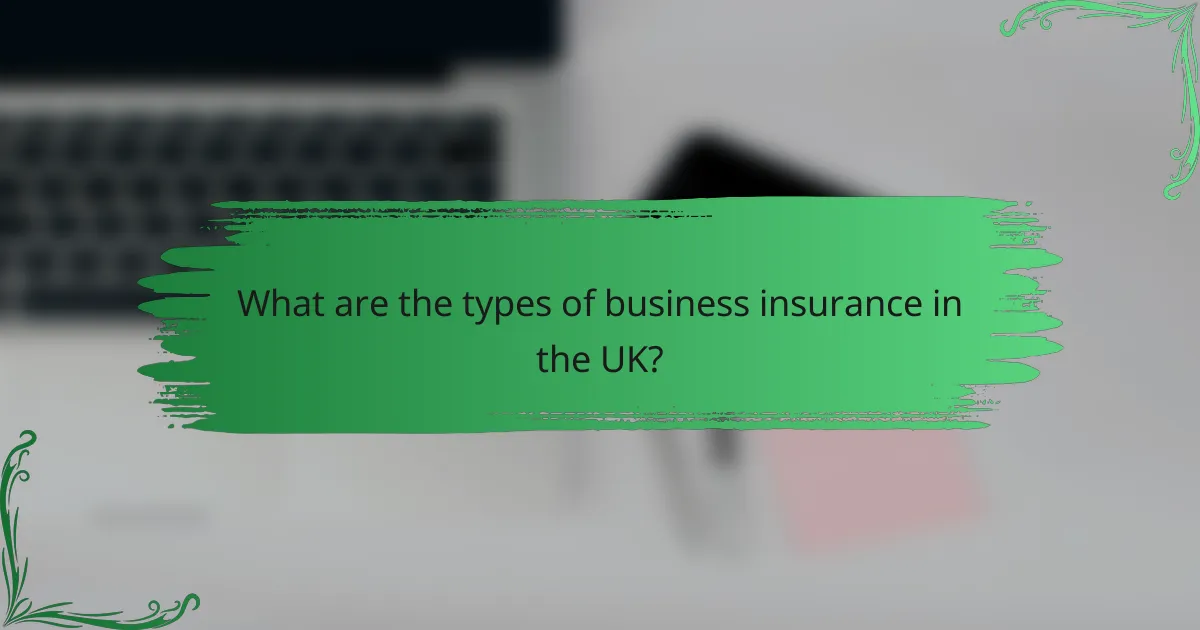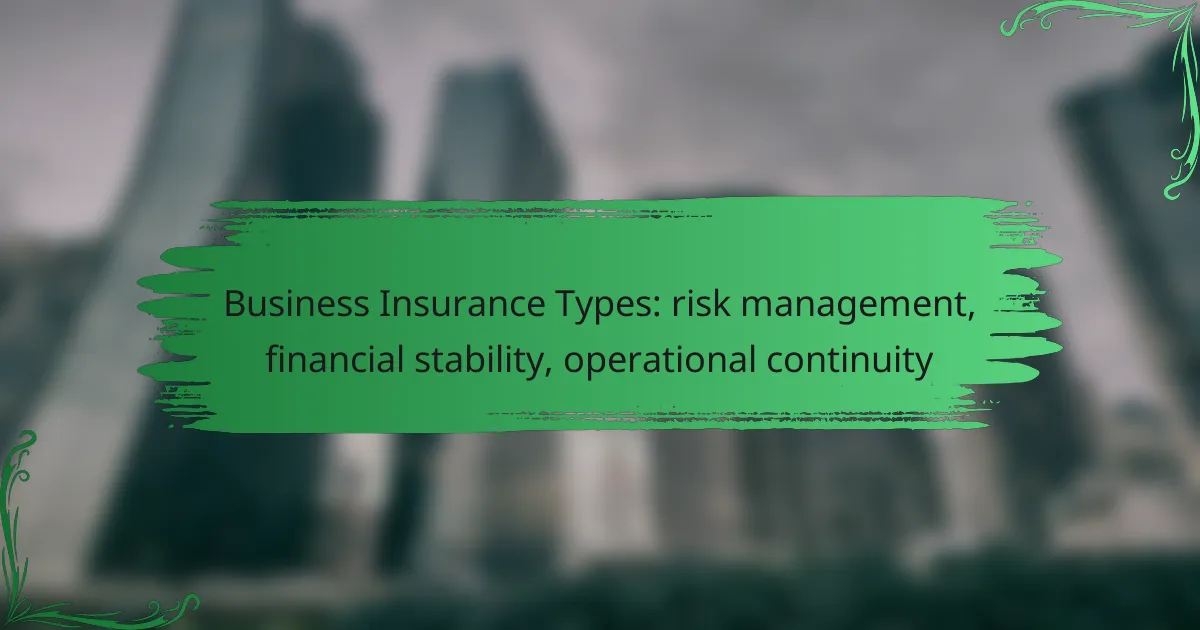In the UK, businesses can select from a variety of insurance types to safeguard against risks, secure financial stability, and ensure operational continuity. Essential options include public liability, employers’ liability, professional indemnity, commercial property, and business interruption insurance, all designed to provide financial protection against unforeseen events that could disrupt operations.

What are the types of business insurance in the UK?
In the UK, businesses can choose from various types of insurance to protect against risks, ensure financial stability, and maintain operational continuity. Key types include public liability, employers’ liability, professional indemnity, commercial property, and business interruption insurance.
Public liability insurance
Public liability insurance covers claims made by the public for injury or property damage caused by your business activities. This type of insurance is essential for businesses that interact with clients or the general public, as it protects against legal costs and compensation claims.
For example, if a customer slips and falls in your store, public liability insurance can help cover the costs associated with their medical expenses and any legal fees. Many businesses in the UK consider a coverage limit of at least £1 million, but higher limits may be advisable depending on the nature of the business.
Employers’ liability insurance
Employers’ liability insurance is a legal requirement for most businesses in the UK with employees. It protects employers against claims from employees who suffer work-related injuries or illnesses, covering legal fees and compensation costs.
The minimum coverage required is £5 million, but many businesses opt for higher limits to ensure adequate protection. Failing to have this insurance can result in significant fines, making it crucial for compliance and risk management.
Professional indemnity insurance
Professional indemnity insurance protects businesses that provide professional services or advice against claims of negligence, errors, or omissions. This type of insurance is particularly important for consultants, accountants, and legal professionals.
In the event of a client claiming financial loss due to your professional advice, this insurance can cover legal costs and compensation. Coverage limits typically start at £250,000, but many professionals choose higher amounts based on the potential risks involved in their services.
Commercial property insurance
Commercial property insurance safeguards your business premises and assets against risks such as fire, theft, and natural disasters. This insurance is vital for protecting physical assets, including buildings, equipment, and inventory.
When selecting a policy, consider the value of your assets and the potential risks specific to your location. Coverage can vary widely, so it’s essential to assess your needs and choose a policy that adequately protects your business property.
Business interruption insurance
Business interruption insurance provides financial support if your business operations are halted due to unforeseen events like fire or flooding. This insurance helps cover lost income and ongoing expenses during the recovery period, ensuring financial stability.
When considering this insurance, evaluate your business’s potential vulnerabilities and the duration of potential interruptions. Policies often cover a range of months, typically from six months to two years, depending on the specific terms and conditions.

How does business insurance manage risk?
Business insurance effectively manages risk by providing financial protection against unexpected events that could disrupt operations or lead to significant losses. It helps businesses mitigate potential financial impacts, ensuring stability and continuity in their operations.
Mitigates financial loss
Business insurance mitigates financial loss by covering expenses related to property damage, theft, or business interruptions. For example, a small business may face significant costs if a fire damages its premises; insurance can cover repairs and lost income during downtime.
When selecting insurance, consider policies that align with your business’s specific risks. Coverage limits should be adequate to protect against potential losses, typically ranging from tens of thousands to millions of dollars, depending on the business size and industry.
Protects against legal claims
Business insurance protects against legal claims by covering legal fees, settlements, or judgments resulting from lawsuits. For instance, general liability insurance can shield a business from claims related to bodily injury or property damage caused by its operations.
It’s essential to assess the types of risks your business may face, such as employee injuries or customer complaints, and choose policies that provide adequate protection. This can help avoid crippling financial burdens from unexpected legal challenges.
Ensures operational continuity
Business insurance ensures operational continuity by providing resources to recover from disruptions, such as natural disasters or equipment failures. Business interruption insurance, for example, can compensate for lost income and ongoing expenses during recovery periods.
To maintain continuity, businesses should regularly review their insurance coverage and update it as needed. This includes ensuring that policies reflect current operations and potential risks, which can vary significantly based on location and industry conditions.

What factors influence business insurance costs in the UK?
Business insurance costs in the UK are influenced by several key factors, including the industry type, business size, and claims history. Understanding these elements can help businesses manage their insurance expenses effectively.
Industry type
The type of industry significantly affects business insurance costs. High-risk sectors, such as construction or manufacturing, typically face higher premiums due to the increased likelihood of accidents and claims. Conversely, low-risk industries like consulting or technology may benefit from lower rates.
Additionally, certain industries may require specific types of coverage, which can also impact costs. For example, businesses in the healthcare sector often need professional indemnity insurance, which can be more expensive than general liability coverage.
Business size
Business size plays a crucial role in determining insurance premiums. Larger businesses usually have more assets to protect and may face higher risks, leading to increased insurance costs. However, they can also benefit from economies of scale, potentially lowering per-employee insurance expenses.
Small businesses, on the other hand, may find it challenging to secure affordable coverage due to limited resources and higher relative risk. It’s essential for small business owners to shop around and compare quotes to find the best value for their specific needs.
Claims history
A business’s claims history is a critical factor in insurance pricing. Companies with a history of frequent or severe claims may face higher premiums as insurers perceive them as higher risk. Maintaining a clean claims record can lead to lower costs over time.
To manage claims history effectively, businesses should implement risk management strategies and safety protocols. Regular training and safety audits can help minimize incidents, ultimately leading to more favorable insurance terms.

How to choose the right business insurance?
Choosing the right business insurance involves understanding your specific risks and selecting coverage that effectively mitigates those risks while ensuring financial stability. Consider your industry, operational needs, and potential liabilities to make an informed decision.
Assess business risks
Begin by identifying the unique risks associated with your business operations. This may include property damage, liability claims, employee injuries, and business interruptions. Conducting a thorough risk assessment helps prioritize which areas require coverage.
Utilize tools such as risk matrices or SWOT analysis to evaluate potential threats. For instance, a retail business may face risks from theft or customer injuries, while a tech startup might focus on data breaches or intellectual property issues.
Compare coverage options
Once you have assessed your risks, compare different insurance policies to find the best fit. Look for coverage types such as general liability, property insurance, and workers’ compensation, and evaluate their limits and exclusions.
Consider obtaining quotes from multiple insurers to understand the cost variations. A small business may find that bundling policies can lead to significant savings, while larger enterprises might need specialized coverage tailored to their operations.
Consult with insurance brokers
Engaging with an insurance broker can provide valuable insights into the complexities of business insurance. Brokers can help you navigate the various options and recommend policies that align with your risk profile and budget.
Choose a broker with experience in your industry to ensure they understand the specific challenges you face. They can also assist in negotiating terms and finding discounts, ultimately helping you secure the best coverage for your needs.

What are the benefits of business insurance?
Business insurance provides essential protection against various risks, ensuring financial stability and operational continuity. By mitigating potential losses, it helps businesses manage uncertainties effectively, safeguarding their assets and reputation.
Risk Management
Business insurance plays a crucial role in risk management by identifying and mitigating potential threats. It allows businesses to transfer the financial burden of unforeseen events, such as natural disasters or liability claims, to the insurer. This proactive approach helps in maintaining operational stability.
Consider policies like general liability insurance, which covers legal fees and damages from lawsuits, or property insurance, which protects physical assets from damage. Businesses should assess their specific risks to choose appropriate coverage that aligns with their operational needs.
Financial Stability
Financial stability is enhanced through business insurance by providing a safety net during challenging times. When unexpected events occur, insurance can cover significant expenses, preventing cash flow disruptions. This financial cushion allows businesses to recover more quickly and maintain ongoing operations.
For example, a business facing a lawsuit can rely on liability insurance to cover legal costs, while property insurance can help replace damaged equipment without draining financial reserves. Regularly reviewing and adjusting coverage ensures that businesses remain adequately protected as they grow.
Operational Continuity
Operational continuity is supported by business insurance, which helps organizations quickly resume normal activities after a disruption. Insurance policies can cover lost income during downtime, allowing businesses to manage expenses while they recover from incidents like fires or theft.
Implementing a comprehensive business continuity plan alongside insurance coverage is advisable. This plan should outline procedures for responding to emergencies, ensuring that employees are trained and resources are allocated effectively. Regular drills and updates to the plan can further enhance resilience against potential disruptions.



